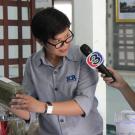Technologies for Horticultural Development fact sheet
Drying beads save high quality seeds
In tropical climates, high humidity causes rapid seed deterioration, resulting in poor stand establishment, lower productivity, reduced market value and a disincentive to invest in improved seeds. Under humid conditions, drying under the sun and other traditional methods cannot reduce seed moisture sufficiently to maintain seed quality. For every 1 percent increase in seed moisture content, seed longevity is reduced by approximately half.
How drying beads work
Drying beads are a desiccant product developed by Rhino Research using zeolite. When used with airtight containers, the drying beads provide a widely adaptable method for drying high-value horticultural seeds and maintaining seed quality during storage. The beads can be reused indefinitely by heating between uses.
Benefits
- Drying beads enable seed producers to dry seeds to very low moisture content without the use of heat, thus preserving seed quality.
- Keeping seeds dry during storage can increase seed longevity, germination rates and plant vigor — ultimately increasing yield capacity for farmers.
- Drying beads can be integrated into local seed systems to improve markets for local and improved cultivars. With increased confidence in seed quality, farmers have greater incentive to invest in seed and can begin their seasons without the penalty of poor seed.
- Drying beads cost $8-15/kilogram and require only an airtight container to keep seed dry. The beads can be recharged in an oven to be used repeatedly.
Scaling success so far
Identifying motivated beneficiaries: By connecting with seed companies that can immediately recognize and recoup benefits of improved seed quality, the team has successfully deployed drying beads into the marketplace, with seed farmers using them and vegetable farmers accessing higher quality vegetable seed.
Effective training and engagement: The team provided week-long trainings to 14 seed leaders repeating 3-7 times over several months, with a possibility of certification. Those leaders have already trained more than 70 staff members, who trained more than 500 seed production farmers.
Growing interest: Success can breed interest, and demand for drying beads is growing. In the wake of this USAID-funded research and public-private partnership, seed companies in India are discussing their own training series, product distributors are lining up, and organizations such as Winrock International, the Bill and Melinda Gates Foundation and the Rockefeller Foundation have started to mobilize.

